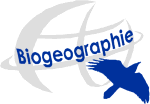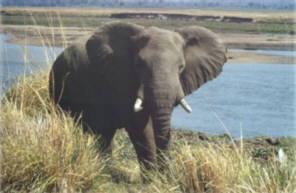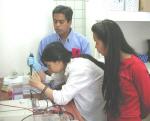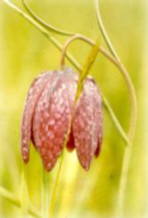|
|
|
 |
 |
 |
 |
BIOGEOGRAPHY |
 |
|
|
The concentration in the field of ecological research was substantially strengthened by the move of Biogeography from the University of the Saarland to the University of Trier. With over 1,5 Mill. EUR outside research funding per year it is also important to employers to the region. Already in 1999, Biogeography participated in the formation of a new centre of special research „environment and region“ (Sonderforschungsbereich “Umwelt und Region”) and on the establishment of a chair for ecotoxicology and toxicology (ecomedicine) founded by German industry.
|
|
|
|
|
The main topics of Biogeography are
· analysis of the spreading of organisms (spatial analysis)
· analysis of habitats and ecosystems and
· application of organisms for environmental assessment (bioindication).
Besides biodiversity and modern bioanalysis, main fields of research of Biogeography and Ecotoxicology are studies of biogeochemical processes, the improvement of biological indication and biomonitoring procedures (among other things DNA adducts), environmental forensics and diagnostics, environmental specimen banking and ecotechnology:
· Analysis of the genesis and dynamic of regional biodiversity in tropical (South America, Africa, South-East Asia), urban and agricultural ecosystems as well as analysis of genes to characterise biogenic material (among other things origin analysis). The derivatives of the existing gen-analytical-lab is of crucial importance for the implementation of a biodiversity centre and the multi-element-analysis are necessary to characterise biogenic material (among other things origin analysis). Biogeography is also the headquarters of the European Wild Research Institute (EWI), Game Conservancy Germany (G.C.D) and the European Inventory System (E.I.S).
|
|
|
|
|
· Assessment of environmental chemicals and environmental samples (environmental specimen bank of the Federal Republic of Germany) by improved storage and referred area sampling methods. Many years of working with the environmental specimen bank of the Federal Repu-blic of Germany (since 1978) which was expanded in 2000 is of crucial importance, as to the field of forensic medical documentation.
Improvement of biological indication procedures for the assessment of land uses, technologies and environmental effects in different ecosystems as a basis for risk assessment. Improved epidemiology and biomonitoring procedures (biomarkers, biosensors).
· Research projects within the framework of the urban ecosystem research with close connections to ecomedicine (foundation chair) including system concepts and the assessment of adaptive activity systems of humans to urban conditions as well as special adaptations (genetic changes) and information from plants and animals for the assessment of human-influenced habitats.
· Derivatives of ecobalance and the ecoefficiency models are for future technologies as well as for environment-management-strategies to represent for example the prerequest for improved ecoauditing or ISO-standards (ISO 9000 / ISO 14000).
|
|
|
· Advancement of the existing Ecotechnological Task Force which works within the framework of the development cooperation particularly in the countries of the tropics and subtropics.
· Bioinformatics. Study groups in the Biogeography have been busy for years with computer based assessment of the state of complicated biological systems (dose-effect-relations). Study groups in the Biogeography have been working for years on different technical solutions compatible with environment, ecobalances, ecoauditing, certification according to ISO.
· Other important fields of research are biomarkers and the environmental specimen bank which can be used for industrial and commercial activities.
The industrial research projects of Biogeography are of special importance. In the labs the most important residual-analysis-procedures can be applied to inorganic and organic trace materials. It is possible to prove Cotenin, heavy metals or metabolites of drugs, for example, in human hair, and to identify the DNA structure at the same moment (among other things court certificate, road accident-clarification, food and drinking water analysis).
In this context, effect analysis of environment chemicals and pesticides have to be mentioned, in particular the impact of insecticides, herbicides and fungicides (areas of application in South-East Asia, Africa, South America and Central Europe). Biogeography has a close and long cooperation with research labs of the Chemical industry (BASF, BAYER, HOECHST).
Biogeography is integrated as a main and minor subject into the diploma degree of “Applied Environmental Sciences” and “Applied Biogeography” (offered from the winter term 2001/2002 for the first time at a German university). The same is provided for the “ Master of Science in Environmental Assessment, Technology and Management”. Master of Science in Environmental Assessment, Technology and Management”.
|
|
|
|
|
Regularly offered lectures are
· Ring lecture: Biogeography, Methods of Biogeography
· Ring lecture: Biodiversity, Bioanalysis and Ecophysiology
· Ring lecture: Applied and special Biogeography, chemical effect on organisms
· Lecture: Material and energy flows in ecosystems
· Lecture: Ecobalances and Ecotechnology
· Biogeographical methods I: Bases
· Biogeographical methods II: Knowledge of species
· Biogeographical methods III: Environmental assessment
· Biogeographical methods IV: Corology
· Biological statistics
· Biogeographical assessment methods
· Visualisation of environmental data by GIS
· Nature protection and wildlife management.
Occupation fields
· engineering and planning offices
· environment and nature protection agencies
· research and teaching.
Head of Department
Prof. Dr. rer. nat. Dr. h.c. mult. Paul Müller
E-Mail:  muellerp@uni-trier.de muellerp@uni-trier.de
+49 (0)651 201-4691
Secretary
N.N.
E-Mail:  muellerp@uni-trier.de muellerp@uni-trier.de
+49 (0)651 201-4690
Scientific Staff
Dr. Martina Bartel
Dr. Ortwin Elle
Dipl.-Umweltwiss. Jan-Christian Habel
Dr. Xiaohua He
Dr. Daniel Hoffmann
Dr. Ralf Kautenburger
Priv.Doz. Dr. Roland Klein
Dr. Joachim Krüger
Dipl.-Geogr. Markus Monzel
Prof. Dr. Mechthild Neitzke
PrivDoz. Dr. Martin Paulus
Dipl.Geogr. Rebecca Retzlaff
Dipl.-Geogr. Markus Quack
Dipl.-Geogr. Bettina Schmitt
Dr. Thomas Schmitt
Dr. Gerhard Wagner
Dipl.-Biol. Marco Zimmermann
Study advisor (Applied Biogeography)
Dr. Xiaohua He
E-Mail:  he@uni-trier.de he@uni-trier.de
+49 (0)651 201-3718
Priv.Doz. Dr. Roland Klein
E-Mail:  kleinr@uni-trier.de kleinr@uni-trier.de
+49 (0)651 201-4695
Study advisor (EATM)
Dr. Joachim Krüger
E-Mail:  kruegerj@uni-trier.de kruegerj@uni-trier.de
+49 (0)651 201-3724
Priv.Doz. Dr. Martin Paulus
E-Mail:  paulus@uni-trier.de paulus@uni-trier.de
+49 (0)651 201-4662
 Homepage Biogeography Homepage Biogeography
|
|
|
|





